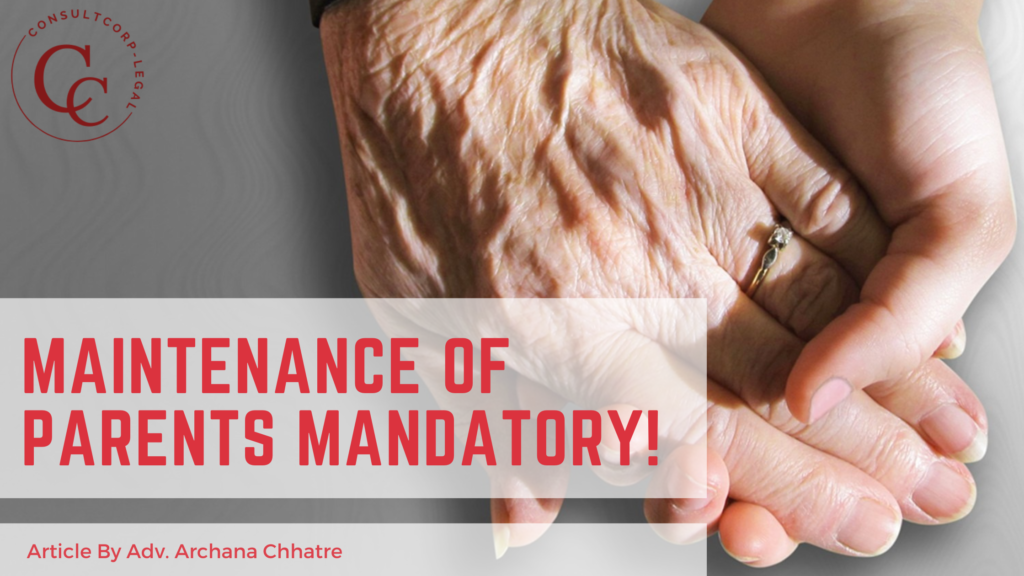Indian culture puts moral binding on the people to take care of wellbeing of Parents and Senior Citizens. It is expected that elders should be taken care of by their children and other relatives (specially in case of childless ones). However, day by day natural love and moral bindings are weakening. As a result, cases of abandoning parents, negligence towards Senior Citizens is increasing. Although due to various reasons children cannot live with parents, they are expected to provide them with monetary support. More painful situation is of those Parents or Senior Citizens who have transferred their properties in the name of their children or relatives with great confidence and trust in them and later they are abandoned by their children or relatives. In case of some either they don’t have any savings, or they have insufficient savings and therefore they need support from their children or relatives to maintain themselves. Keeping in view all such problems related to Senior Citizens and Parents legislature has provided legal safeguard to them by enacting The Maintenance and Welfare of Parents and Senior Citizens Act. This Act came into force in 2007.
Section 4 of the Act clearly states that A senior citizen including parent who is unable to maintain himself from his own earning or out of property owned by him, shall be entitled to make an application for maintenance before the Maintenance Tribunal constituted under Section 7 of this Act. Thus, Senior Citizens and Parents are eligible to claim maintenance under this Act. Section 2 of the Act clarifies that the term ‘Parent’ means Father or Mother whether biological, adoptive or step one. It further clarifies that any parent is eligible to apply for Maintenance under this whether he or she is or is not a Senior Citizen. Thus, being Senior Citizen is not mandatory condition for any Parent under this Act. Senior Citizen is anyone who has attained age of 60 yrs. The Section also states the term ‘Children’ include Son, Daughter, Grandson, Granddaughter but does not include Minor. Under the provisions of this Act ‘Maintenance’ includes provisions for food, clothing, residence and medical attendance and treatment. The obligation of children or relative to maintain parent or senior citizen extends to the need of such parent or senior citizen to live normal life. In case of senior citizen relative means any legal heir, who is not minor and who is in possession of or would inherit his property after his death.
As per the provisions of this Act, Senior Citizen or Parent can file Maintenance application on their own or through any authorized representative like any NGO. Section 17 bars representation by Legal practitioner. In certain apt cases the Tribunal can take Suo Motu action. On receipt of Application, Notice is issued to Respondent (against whom application is filed). After recording Evidences, order is passed by Tribunal. If willful absence of Respondent is proved or he neglects to receive summons, Tribunal may pass Ex-parte order. Thus, procedure is simplified considering the overall condition of Applicant. Also, it is mandatory to dispose off such cases within 90 days from service of Notice. However, in exceptional cases time can be extended upto 30 days after recording the reasons. Since Tribunal has endowed with powers of Civil Court, if Respondent fails to comply with the orders of Tribunal and Application is filed for that in 3 months of non-payment, Tribunal can issue Warrant and on further failure of payment Respondent can be imprisoned upto one month or until payment, whichever is earlier. These proceedings may be taken up against children or relative by Parent or Senior Citizen in any district where he resides or last resided or where children or relative resides. On being applied Tribunal may grant interim maintenance to Applicant parent or senior citizen.
Section 23 provides great relief to the parents and senior citizens who have transferred their properties to their children or relatives and are abandoned or neglected by them, by making such transfer void. Under this section if any senior citizen has transferred by way of gift or otherwise, his property, subject to the condition that the transferee shall provide the basic amenities and basic physical needs to the Transferor and that if Transferee refuses or fails to provide such amenities and physical needs then such transfer may be declared void by the Tribunal. However, that does not mean that transfer deed should contain the clause to that effect. In Radhamani and others V State of Kerala (20 16(1) KHC 9) Kerala High Court clarified that ‘there is no requirement of a written stipulation to effect that the transferee maintains the transferor’.
Considering certain cases of taking parents or senior citizens to unknown areas and abandoning them, act also provides under Section 25 that whoever having the care or protection of senior citizen leaves, such senior citizen in any place with the intention of wholly abandoning such senior citizen , shall be punishable with imprisonment of 3 months or fine upto Rs.5000/- or both.
By the Amendment Bill 2019 to the above-mentioned Act, scope of certain provisions and terms under the Act has been planned to be widened. For instance the term ‘Children’ would include son-in-law, daughter-in-law and legal guardian of minor child alongwith son, daughter, grandson, grand-daughter and the term ‘Paernt’ would include father-in-law, mother-in-law alongwith biological, adoptive and step parents.
Thus, Legislature has taken note of changing situations and given legal relief to the deprived or cheated Senior Citizens and Parents. The need of hour is to make them aware of these provisions and make their old life safer and more peaceful.
If you need legal help to get maintenance under this Act, contact us on info@consultcorplegal.com

